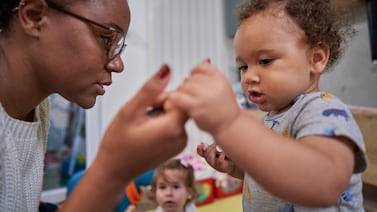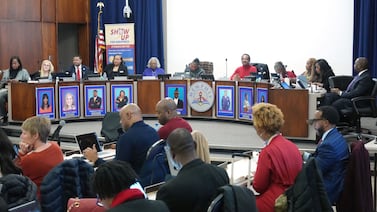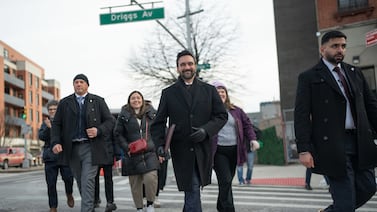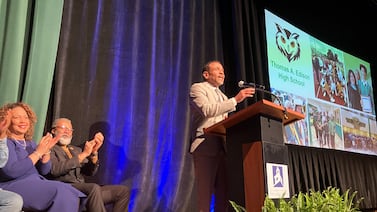On the surface, New Yorkers might assume that the state’s candidates for governor — Democratic Gov. Kathy Hochul and Republican Lee Zeldin — would have polar opposite approaches to education if they were elected.
And while that likely holds true in several ways, there are still many open questions about how both would craft policy for schools.
Hochul has not focused much at all on education on the campaign trail, and while her time in office so far provides some clues, her campaign website has no details about her goals for the state’s K-12 schools beyond wanting to invest more money in them.
“As a frontrunner she has little incentive to take sharp or even very precise and specific positions, particularly on policies that are at all controversial, particularly policies that are controversial in suburbs,” said Jeffrey Henig, professor of political science and education at Columbia University’s Teachers College.
In contrast, Zeldin is “throwing everything at the wall that Republicans are trying in lots of places,” Henig said.
The congressman has proposed several priorities, such as banning “divisive concepts” from being taught in schools related to race — a talking point that conservatives across the country have embraced — but he has not provided more specifics on many of his ideas. Some of his proposals are self explanatory, such as wanting to lift the cap on how many charter schools can open in New York.
Zeldin’s campaign did not respond to questions asking to elaborate on his positions or provide more details.
As the governor’s race nears this fall, here’s what we know about where both fall on education issues:
Curriculum
Zeldin has said he would ban “divisive curriculum that pits children against one another based on race and other factors” — language that’s similar to what conservative lawmakers in other states have pushed for.
His platform does not explicitly talk about critical race theory, or CRT, which is an academic framework for studying systemic racism but has been used by Republicans as an umbrella term for diversity and inclusion efforts. Both city and state officials have said critical race theory is not taught in the city’s and state’s public schools. Both locally and statewide, officials have encouraged schools to teach culturally responsive lessons.
But Zeldin wrote in an opinion article last year that CRT was politicizing education. In it, he blasted a lengthy framework released by the state education department that encourages — but does not mandate — districts to teach culturally responsive lessons, or lessons that relate to and affirm various students’ backgrounds. The department also wants districts to consider acknowledging the role of racism in American history and create lessons that empower students to be “agents of change.”
Zeldin’s platform also calls for restricting “age-inappropriate” sex education, though it does not detail what that means, requiring financial literacy courses in public schools, and civics lessons that “teach students about how and why they get to live in the greatest nation in the history of the world.”
Still, if Zeldin were elected, it’s unlikely that he would be able to successfully ban schools from teaching about race since the state legislature is overwhelmingly Democratic and unsupportive of such policies. For example, a bill seeking to ban critical race theory in schools didn’t make it out of committee last year.
“You may see outside money and national organizations try to come in and really sort of add amplitude to those messages around parental rights and critical race theory and gender identity issues,” Henig said. “I don’t want to discount the importance of how people talk about things, but the impact on actual policy would be delayed, at best.”
So far, Hochul has not taken a strong position on what sorts of curriculum or learning standards she supports in schools. When pressed about a New York Times investigation that revealed a lack of basic lessons in core subjects, such as English, in Hasidic yeshivas, Hochul said responsibility over those private religious schools fell to the state education department, not her office. (Zeldin has been supportive of the Hasidic yeshivas, and has been courting the vote of the Orthodox and Hasidic communities, the New York Times reported.)
Asked where Hochul stands on curriculum, her campaign pointed to an ABC 7 story from May, where she said she supported a bill that would have required New York schools to teach about Asian American history. (The bill did not move out of committee.) They also pointed to a bill she signed that requires the state education department to ensure school districts are meeting requirements to teach children about the Holocaust — an idea that Zeldin also supports.
Traditional public schools vs. charter schools
Zeldin has expressed substantial support for school choice and charter schools. In fact, he first announced his education agenda last spring outside of a Success Academy school in Queens.
Zeldin supports lifting the cap on how many charter schools can open in New York, which was reached in the city in 2019. He also wants to establish “tax credits for school choice” and create education savings accounts, but doesn’t provide more details. With an education savings account, parents can withdraw their children from public schools and receive tax dollars in a restricted-use account to pay for private school or other educational options like therapy.
The state legislature so far has not supported lifting the charter cap.
Zeldin’s platform online says he wants more options for “technical grade school level learning, experience and certification,” though it’s unclear if he’s referring to career preparation programs or something else.
On the city level, Zeldin saw eye to eye with Mayor Eric Adams and Hochul on extending mayoral control of schools. And, like Adams, Zeldin also supports keeping the controversial admissions exam in place for the city’s specialized high schools, as well as “advanced and specialized” academics. He’s earned the support of some parents who favor screened admissions to the city’s public middle and high schools and “gifted and talented” programs.
During a debate with Zeldin on Oct. 25, Hochul also said she supported lifting the charter school cap, which seemed to be the first time she said that publicly. [Note: This story originally published before the debate and was updated to reflect her comment.] She’s repeatedly touted overseeing a budget that sent more state money to school districts as the result of an agreement to fully fund Foundation Aid, the state funding formula that sends more money to higher needs districts.
Hochul has taken an interest in boosting mental health resources for students, ensuring more children go to college, specifically by expanding college tuition assistance to part-time students in New York, and has attempted to address the teacher shortage by expanding alternative teacher certification programs and temporarily waiving an income cap for teacher retirees who want to return to the profession.
She also signed a popular bill that requires lower class sizes in New York City, which was celebrated by many families, the teachers union, and advocates. City officials and some conservative parent groups pushed back, arguing the mandate would pull money away from other services for students.
School budgets and enrollment
Neither Hochul nor Zeldin have addressed one of the most critical issues facing public schools: dipping enrollment.
Enrollment in traditional public schools has dropped by more than 2% nationwide since the onset of the pandemic, and by about 9.5% in New York City public schools. Changes in enrollment have big implications for school budgets that are closely tied to the number of students in classrooms. That issue is already playing out in New York City, where three-quarters of schools saw cuts in the funding that pays for staff and programs for students.
Zeldin’s education platform doesn’t address the issue. While Hochul has touted her commitment to boosting funding for public schools, she has not addressed what to do about enrollment changes across the state.
“What you see on the Hochul side is, ‘Yes, we support education, we are willing to spend more on it,’ but kind of resisting what progressive forces might want to see on the campaign, in terms of challenging basic funding formulas in ways that might not play well in wealthy or more affluent communities that would see this as redirecting state monies away from them and towards lower-income communities,” Henig said.
COVID policies
Most COVID mitigations for schools have ended, so it’s not likely that the election of either candidate would drastically change that.
Both Zeldin and Hochul have supported peeling back COVID mitigations, such as masking, with Hochul recently calling remote learning a “mistake.” But Zeldin has pushed harder to remove all sorts of mandates.
While Hochul ended mask mandates, she also oversaw sending at-home COVID tests to schools and has touted keeping schools open during a major surge in infections last winter, though in-person instruction was still severely disrupted. (She’s come under fire in recent weeks for a deal she made when choosing a vendor for those tests.)
Zeldin has opposed COVID vaccine and mask mandates. If elected, he may press Adams to drop a vaccine mandate in place for New York City schools staff. At one point, Hochul expressed support for requiring children to get COVID vaccines. The state legislature would have to pass a bill that added COVID vaccines to the list of already required shots for school children, according to the New York Times.
Reema Amin is a reporter covering New York City schools with a focus on state policy and English language learners. Contact Reema at ramin@chalkbeat.org.






